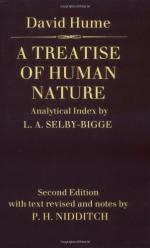
|
| Name: _________________________ | Period: ___________________ |
This test consists of 5 multiple choice questions, 5 short answer questions, and 10 short essay questions.
Multiple Choice Questions
1. In what does Hume say he finds it difficult to put faith?
(a) The external world.
(b) Imagination.
(c) Knowledge.
(d) The internal world.
2. What does Hume claim is a fictitious denomination?
(a) The idea of unity.
(b) The idea of justice.
(c) The idea of love.
(d) The idea of morals.
3. To whom does Hume say he should leave the study to productive passions?
(a) Scholars.
(b) Theologists.
(c) Scientists.
(d) School teachers.
4. What does Hume believe humans generate instead of observing causes?
(a) Sympathy about causes.
(b) Beliefs about causes.
(c) Judgements about causes.
(d) Morals about causes.
5. What is the name of the system used to prove the existence of God?
(a) Christian science.
(b) Metaphysics.
(c) Astrology.
(d) Theology.
Short Answer Questions
1. What does Hume identify as the second philosophical relation?
2. Which is the following is the best definition of the razor principle?
3. Under what two general classes do relations come?
4. What kind of soul does Hume believe does not exist?
5. Hume thinks it is pointless to wonder about the existence of what?
Short Essay Questions
1. In terms of philosophy what is empiricism?
2. Why does Hume think it is pointless to wonder about the external world?
3. Why is resemblance so important in terms of relation?
4. Why does Hume reject the idea of an immaterial soul?
5. In what way does Hume say the mind can be dishonest?
6. What is the difference between reflexion and sensation impressions?
7. What are Dr. Clarke's views on cause and effect?
8. How does Hume claim the mind perceives time?
9. What are Hume's views on causation?
10. What is the conventional view of cause and effect?
|
This section contains 685 words (approx. 3 pages at 300 words per page) |

|




